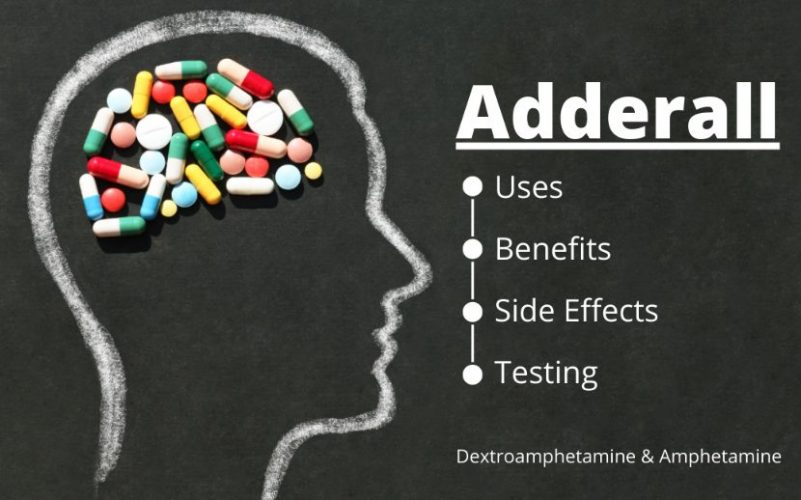Adderall is the brand name for a Dextroamphetamine and Amphetamine combination. The Food and Drug Administration (FDA) has approved Adderall for attention deficit hyperactivity disorder (ADHD) and narcolepsy. Adderall, as a central nervous system stimulant, can assist concentration and focus for people that have ADHD.
Adderall interacts with naturally occurring chemicals in your brain by increasing the activity of neurotransmitters such as dopamine, norepinephrine, and, to a smaller extent, serotonin. Adderall is a first-line therapy option for ADHD. Adderall studies show that the drug can improve attention and focus while decreasing impulsive behaviors. Stimulants like Adderall will help between 75 and 80 percent of teenagers with ADHD improve their symptoms. Although there are fewer clinic studies on the subject, Adderall can potentially boost daytime wakefulness in patients with narcolepsy.
Adderall is available as an immediate-release tablet or as a time-release capsule (Adderall XR). Because it can disrupt sleep, you should take it in the morning. If you have been prescribed Adderall, your doctor will likely begin with a low dose to ensure you can tolerate the substance. Then your doctor will gradually raise the dosage.
Adderall is a Class II-controlled drug. It means that it has the potential to cause psychological or physical dependence as well as misuse. The government has implemented regulations that govern how controlled substances are prescribed and administered. In addition, for each refill, you must obtain a valid prescription from your doctor. Before taking Adderall, consult your doctor about any prior medical or mental health issues you may have, as well as a list of all prescription and over-the-counter medications you are currently taking. Other drugs may interact with Adderall, resulting in serious side effects.
Uses:
This drug can treat ADHD (Attention Deficit Hyperactivity Disorder). It changes the concentrations of some chemicals in the brain. Amphetamine/Dextroamphetamine is a stimulant drug.
- It can assist you in improving your ability to pay attention, focus on an activity, and address behavioral problems.
- It may also help you organize your tasks and improve your listening skills.
- This medication can help you stay awake during the day if you have a sleeping disorder (narcolepsy). You should not use it to cure sleepiness or to avoid sleeping if you do not have a sleeping disorder.
When taken at a doctor-recommended dosage, Adderall is safe to use for a long time. Many people find that continuing to use the medication reduces typical side effects like loss of appetite, dry mouth, or insomnia. These adverse effects may persist for others.
Long-term use of Adderall or other stimulants may result in brain alterations such as decreased levels of the chemical messenger dopamine. It appears to be more prevalent in persons who abuse Adderall in high doses. Adderall can be highly dangerous when taken in non-recommended high doses, which makes the need for accurate drug testing for Adderall an important system for a wide variety of applications.
Benefits:
Because Adderall is a central nervous system stimulant, it helps patients with ADHD improve their focus and concentration. Those who do not have ADHD experience similar reactions to those that have ADHD when they take Adderall.
Adderall’s two active ingredients, Amphetamine and Dextroamphetamine, act by influencing the levels of various neurotransmitters in the brain, including dopamine, adrenaline (also known as epinephrine), and norepinephrine. The immediate release formulation lasts 4 to 6 hours, while the extended-release formulation lasts 8 to 12 hours.
ADHD:
ADHD (Attention Deficit Hyperactivity Disorder) is a neurological illness that affects your ability to focus, sit still, and control your behavior. It begins in childhood and can continue through adolescence and into adulthood.
The most frequent mental condition among teenagers is ADHD. It is frequently recognized in the early school years when a child begins to struggle with paying attention.
Adderall is one of the most widely used ADHD drugs. People with ADHD have high neurotransmitter levels. When used with psychotherapy, Adderall can reduce excitement and help them perform better. Several studies have indicated that Adderall is useful in treating ADHD symptoms, including:
- Aggression
- Irritated behavior
- Impulse control
- Hyperactivity-impulsivity and inattention
Narcolepsy:
People with narcolepsy do not have enough neurotransmitters to keep them alert and focused. Narcolepsy is a persistent sleep condition characterized by excessive daytime tiredness and unexpected sleep episodes. People with narcolepsy frequently struggle to stay up for a long time. Narcolepsy can severely interrupt daily life.
Narcolepsy sometimes occurs with a rapid loss of muscular tone (cataplexy), which can be provoked by intense emotional stress. Narcolepsy associated with cataplexy is Type 1 Narcolepsy. Type 2 Narcolepsy presents without cataplexy.
Narcolepsy is a chronic illness with no known cure. Medication, such as Adderall, can help you manage your symptoms. By stimulating the brain and imitating the actions of neurotransmitters, Adderall can help people with narcolepsy stay active throughout the day. When used as instructed, Adderall’s central nervous system effects can be beneficial. During the day, subjects with Narcolepsy may feel more awake, as well as more focused and relaxed.
Side Effects:
Licensed professionals will only prescribe this drug because they have determined that the benefit to you outweighs the risks of side effects. Many individuals who use this drug have no adverse effects when taken in recommended dosages. Adderall may cause the following side effects:
Fatigue:
Fatigue may occur in 2% to 4% of people taking Adderall at commonly prescribed dosages. This effect may reduce when you build tolerance to the medicine. Fatigue may be more common in Adderall abusers, especially at high dosage. Additionally, persons who have become addicted to Adderall may experience significant tiredness if they discontinue it.
Nausea:
Nausea is a typical adverse effect of Adderall. In some trials, 5% to 8% of individuals using Adderall experienced nausea. This effect may reduce when you regularly use the medicine for a long period of time.
Headache:
One of the most prevalent Adderall side effects are headaches. Headaches were reported in up to 26% of Adderall users. This effect may reduce when you use the medicine for a longer period of time.
Constipation:
Constipation is a significant side effect of Adderall. Constipation was reported in 2% to 4% of patients who took Adderall. This effect may reduce when you use the medicine longer.
Erectile Dysfunction:
Males using Adderall do not have erectile dysfunction, but some report being less interested in sex. If you have this adverse effect and it does not go away, consult your doctor. Males who abuse amphetamines like Adderall may have erectile dysfunction and changes in sexual drive.
Hair Loss:
Some Adderall users have noticed hair loss. However, it is unclear how frequently this occurs or whether Adderall is the cause of the hair loss. More information and studies are required.
Dry Mouth:
Adderall XR can cause dry mouth in up to 35% of persons who use it. This effect may reduce when you use the medicine longer.
Psychosis:
Psychotic symptoms such as hallucinations, agitation, or disturbed thinking are rare adverse effects of Adderall. These symptoms have developed in some people taking the generally prescribed doses of Adderall.
People with a history of psychosis before starting Adderall are more likely to experience psychotic symptoms. They are also more common in Adderall abusers. If you experience this side effect while taking Adderall, contact your doctor. You may need to discontinue Adderall.
Sweating:
Some Adderall users experience increased sweating. It appears to occur in approximately 2% to 4% of Adderall XR users. This effect may reduce when you use the drug for a longer period of time.
Chest Pain:
People with healthy hearts rarely experience chest pain while using Adderall. If you do, this could indicate that you have a cardiac issue. If you get chest pain after taking Adderall, contact your doctor immediately.
Insomnia:
One of the most frequent adverse effects is insomnia, or difficulty sleeping. As many as 27% of Adderall XR users may experience sleeplessness.
Circulatory And Respiratory Systems:
In some situations, Adderall can interfere with your blood circulation. Your fingers and toes may go numb or in pain. They may even change color to blue or red. Serious side effects to these systems can include heart attacks and strokes. Adderall can cause death in individuals who already have heart problems.
Side Effects in Children:
While taking Adderall, some children may experience slightly slower growth in height and weight. It is usually a temporary slowdown in the child’s growth. During Adderall treatment, your doctor will check your child’s growth.
Please Remember That:
Adderall has the potential to become addictive, and it is a controlled substance. Inform your doctor if you have a history of drug or alcohol abuse. In individuals with increased blood pressure, cardiac disease, or a heart defect, it can cause heart attack and sudden death. If you’ve taken an MAO inhibitor in the last 14 days, such as Isocarboxazid, Linezolid, Phenelzine, Rasagiline, Selegiline, or Tranylcypromine, or if you’ve had a Methylene Blue injection, don’t take this medication.
If you have a history of depression, mental illness, or bipolar disorder, Adderall may cause severe psychosis. It can cause blood circulation issues. It can also cause numbness, pain, or discoloration in your fingers or toes.
If you develop any of the following symptoms, contact your doctor immediately:
- Chest pain
- Dizziness
- Shortness of breath
- Paranoia
- Aggressiveness
- New behavioral issues
- Seeing or hearing things that are not real
Testing for Adderall
To test for Adderall, you are testing for Amphetamines (AMP). Amphetamines are a drug class of central nervous system stimulants. And since ADHD is such a prevalent diagnosis and so many people have access to and are introduced to Adderall the potential for abuse is high. Adderall can be detected in urine for 2-4 days after use, saliva for 1-3 days, and hair for up to 90 days after last use. Testing for Adderall and other Amphetamines is an important step in preventing Adderall and drug abuse.



